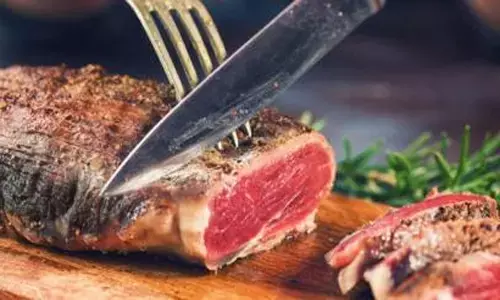- Home
- Medical news & Guidelines
- Anesthesiology
- Cardiology and CTVS
- Critical Care
- Dentistry
- Dermatology
- Diabetes and Endocrinology
- ENT
- Gastroenterology
- Medicine
- Nephrology
- Neurology
- Obstretics-Gynaecology
- Oncology
- Ophthalmology
- Orthopaedics
- Pediatrics-Neonatology
- Psychiatry
- Pulmonology
- Radiology
- Surgery
- Urology
- Laboratory Medicine
- Diet
- Nursing
- Paramedical
- Physiotherapy
- Health news
- Fact Check
- Bone Health Fact Check
- Brain Health Fact Check
- Cancer Related Fact Check
- Child Care Fact Check
- Dental and oral health fact check
- Diabetes and metabolic health fact check
- Diet and Nutrition Fact Check
- Eye and ENT Care Fact Check
- Fitness fact check
- Gut health fact check
- Heart health fact check
- Kidney health fact check
- Medical education fact check
- Men's health fact check
- Respiratory fact check
- Skin and hair care fact check
- Vaccine and Immunization fact check
- Women's health fact check
- AYUSH
- State News
- Andaman and Nicobar Islands
- Andhra Pradesh
- Arunachal Pradesh
- Assam
- Bihar
- Chandigarh
- Chattisgarh
- Dadra and Nagar Haveli
- Daman and Diu
- Delhi
- Goa
- Gujarat
- Haryana
- Himachal Pradesh
- Jammu & Kashmir
- Jharkhand
- Karnataka
- Kerala
- Ladakh
- Lakshadweep
- Madhya Pradesh
- Maharashtra
- Manipur
- Meghalaya
- Mizoram
- Nagaland
- Odisha
- Puducherry
- Punjab
- Rajasthan
- Sikkim
- Tamil Nadu
- Telangana
- Tripura
- Uttar Pradesh
- Uttrakhand
- West Bengal
- Medical Education
- Industry
Red meat increases risk of cardiovascular disease finds study

USA: Consuming processed meat, unprocessed red meat, or poultry, but not fish increases the risk of cardiovascular disease (CVD), a recent study published in the journal JAMA Internal Medicine has found. The study further found that -- Intake of processed meat or unprocessed red meat, but not poultry or fish increased the risk of dying from all causes.
The new findings are in contradiction to a recent study that recommended people not to reduce their consumption of red meat and processed meat.
According to the new study, eating two servings of red meat, processed meat or poultry -- but not fish -- per week was linked to a 3 to 7% higher risk of cardiovascular disease. Eating two servings of red meat or processed meat -- but not poultry or fish -- per week was associated with a 3% higher risk of all causes of death.
Victor W. Zhong, Division of Nutritional Sciences, Cornell University, Ithaca, New York, and colleagues conducted the study to identify the associations of processed meat, unprocessed red meat, poultry, or fish intake with incident CVD and all-cause mortality.
"It's a small difference, but it's worth trying to reduce red meat and processed meat like pepperoni, bologna and deli meats," said senior study author Norrina Allen, associate professor of preventive medicine at Northwestern University Feinberg School of Medicine. "Red meat consumption also is consistently linked to other health problems like cancer."
"Modifying intake of these animal protein foods may be an important strategy to help reduce the risk of cardiovascular disease and premature death at a population level," said Dr. Zhong.
"Our study shows the link to cardiovascular disease and mortality was robust," Zhong said.
The new study pooled together a large diverse sample from six cohorts, included long follow-up data up to three decades, harmonized diet data to reduce heterogeneity, adjusted a comprehensive set of confounders and conducted multiple sensitivity analyses. The study included 29,682 participants (mean age of 53.7 years at baseline, 44.4% men and 30.7% non-white). Diet data were self-reported by participants, who were asked a long list of what they ate for the previous year or month.
Key findings of the study include:
- A 3 to 7% higher risk of cardiovascular disease and premature death for people who ate red meat and processed meat two servings a week.
- A 4% higher risk of cardiovascular disease for people who ate two servings per week of poultry, but the evidence so far is not sufficient to make a clear recommendation about poultry intake. And the relationship may be related to the method of cooking the chicken and consumption of the skin rather than the chicken meat itself.
- No association between eating fish and cardiovascular disease or mortality.
"These findings have important public health implications and should warrant further investigations," concluded the authors.
What should we eat?
"Fish, seafood and plant-based sources of protein such as nuts and legumes, including beans and peas, are excellent alternatives to meat and are under-consumed in the U.S.," said study co-author Linda Van Horn, professor of preventive medicine at Feinberg who also is a member of the 2020 U.S. Dietary Guidelines Advisory committee.
The study found a positive association between poultry intake and cardiovascular disease, but the evidence so far isn't sufficient to make a clear recommendation about poultry intake, Zhong said. Still, fried chicken is not recommended.
The study, "Associations of Processed Meat, Unprocessed Red Meat, Poultry, or Fish Intake With Incident Cardiovascular Disease and All-Cause Mortality," is published in the journal JAMA Internal Medicine.
Dr Kamal Kant Kohli-MBBS, DTCD- a chest specialist with more than 30 years of practice and a flair for writing clinical articles, Dr Kamal Kant Kohli joined Medical Dialogues as a Chief Editor of Medical News. Besides writing articles, as an editor, he proofreads and verifies all the medical content published on Medical Dialogues including those coming from journals, studies,medical conferences,guidelines etc. Email: drkohli@medicaldialogues.in. Contact no. 011-43720751


